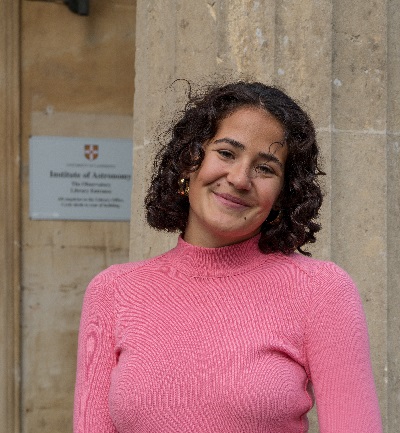Angelica Lola Danhaive, ald66@cam.ac.uk
Belgium and United States
Physics, Girton College
PhD thesis: Probing the Cosmic Dawn: a spectroscopic view of the first galaxies
Research interests:
1. Extragalactic astronomy
2. Galaxy formation and evolution
3. JWST data reduction and analysis
4.Slitless spectroscopy
My PhD focuses on studying the formation and evolution of galaxies from the so-called Cosmic Dawn, the epoch when the first stars formed, to today. These early galaxies have intricate spectra that give us crucial information on their age, structure, and composition. The novel James Webb Space Telescope (JWST) allows us to probe these far away objects for the first time thanks to its unpreceded sensitivity and spectral resolution in the near infrared. I am using slit-less spectroscopy to analyse emission lines from the earliest galaxies that are currently being taken by the JWST (NIRCam instrument with grism mode), allowing me to trace the spatially resolved distributions of star formation, enrichment and dust, as well the kinematics of these properties. I am currently working on both the data reduction and on developing a forward-modelling approach to detangle the different spectral components of the galaxies being observed.
Who or what inspired you to pursue your research interests?
Research in astronomy is the perfect way to reconcile my passion for mathematics and physics with my fascination for space. Studying the first galaxies is crucial for understanding the formation of structure in the universe but also for testing fundamental theories, from gravity to dark matter. All throughout my education, I have been inspired by strong women in my life pursuing their careers in science despite the lack of representation and sometimes encouragement. I am motivated to further our understanding of the history of the universe and hope to one day inspire young girls to continue their path in science.

